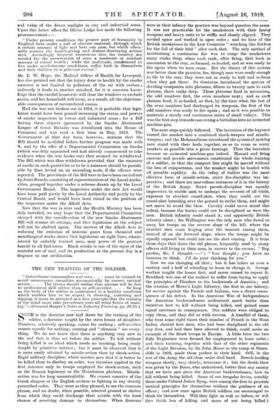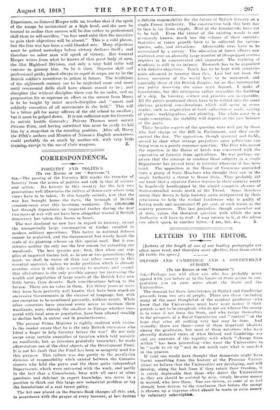1171b NEW TRAINING OF THE SOLDIER.
" Subordinate commanders and men . . . must be trained to avoid unnecessary casualties automatically by correct tactical action. . . . The troops should realize that success will be due to professional skill rather than to sell-sacrifice. . . . So long as the body of the soldier is maintained in a healthy condition which enables him to be expert in shooting, marching and digging, it must be accepted as a first principle that the training of the mind must take precedence over all other forms of train- ing."--(General Harper's Notes on Infantry Training, pp. 20-21.) Q UCH is the doctrine now laid down for the training of the 1.3 soldier, a doctrine taught by the stern lesson of slaughter. Numbers, relatively speaking, count for nothing ; self-sacrifice counts equally for nothing; cunning and " slimness " are every- thing. We do not know that there is anything very new in the end that is thus set before the soldier. To kill without being killed is an ideal which needs no teaching, being ready taught by primitive instinct ; but it must be observed that it is more easily attained by missile-action than by shock-action. Rigid military discipline, which teaches men that it is better to be killed than to disobey an order, was therefore applied in the first instance only to troops employed for shock-action, such as the Roman legionary or the Macedonian phalanx. Missile- action was for long uncontrollable. We cannot conceive of the Greek clingers or the English archers as fighting in any strictly prescribed order. They went as they pleased, to use the common phrase, and no doubt, when possible, selected ground or shelter from which they could discharge their missile with the least chance of receiving damage to themselves. When firearms
were in their infancy the practice was beyond question the same It was not practicable for the musketeers with their heavy weapons and heavy rests to be stiffly and closely aligned. They needed space and worked in open order ; and we hear of the British musketeers in the Low Countries " watching like fowlers for the fall of their bird " after each shot. The only method of
maintaining a continuous fire was to range the musketeers many ranks deep, when each rank, after firing, filed back in succession to the rear, re-formed, re-loaded, and so was ready to fire again when its turn came. But the theory of this system was better than the practice, for, though men were ready enough to filo to the rear, they were not so ready to halt and re-form when they got there. So Gustavus introduced the system of dividing companies into platoons, fifteen to twenty men in each platoon, three ranks deep. These platoons fired in succession, the odd numbers first, the even numbers next ; and as each platoon fired, it re-loaded, so that, by the time when the last of the even numbers had discharged its weapons, the first of the odd numbers was ready to fire again ; and so it was possible to maintain a steady and continuous series of small volleys. This was the first step towards converting a battalion into an animated machine-gun.
The next steps quickly followed. The invention of the bayonet turned the musket into a combined shook-weapon and missile- weapon ; and the Hohenzollerns introduced the system of, making men stand with their heels together, so as to cram as many muskets as possible into a given frontage. Then the battalion became an animated machine-gun indeed. Manual and firing exercise and parade movements constituted the whole training of a soldier, so that the compact line might be moved without the loss of compactness, and the musket might be loaded with all possible rapidity. As the volley of bullets was the most effective form of missile-action, strict fire-discipline was im- perative ; and there are marvellous instances of it in the history of the British Army. Strict parade-discipline was equally imperative to enable men to undergo the severest of all trials, exposure to ricochet round-shot, when they could see the round-shot bounding over the ground to strike them, and might not move to avoid the blow. Cavalry could never stand this ordeal, because the horses could not be disciplined as were the men. British infantry could stand it, and apparently British infantry alone ; for Wellington was the only man who dared to array his troops on the reverse slope of the hill, where the ricochet shot came leaping over the summit among them, instead of on the forward slope, where the troops might be equally exposed but could not see the shot coming. It is from those days that dates the old phrase, frequently used by many officers still living to their men, in answer to the excuse, " Beg pardon, Sir, I thought—" " You thought ; you have no business to think. I'll do your thinking for you."
Now we are changing all that ; but it has taken us over a century and a half of schooling to learn to change it. Savage warfare taught the lesson first, and never ceased to repeat it. Braddock was one of the earliest to suffer from trying to apply the principles of Flanders to the backwoods of America ; and the creation of Howe's Light Infantry, the first in our history, for service against the French and Indians, was a direct conse- quence of his defeat. In the American War of Independence the American backwoodsmen understood much better than ourselves how to kill without being killed, and gained some signal successes in consequence. Our soldiers were obliged to copy them, and they did so with success. A handful of them, who beat some eight times their number of French in the West Indies, showed how men, who had been disciplined in the old way first, and had then been allowed to think, could make an example of the finest troops in Europe. A little later the two Rifle Regiments were formed for employment in loose order ; and their training, together with that of the other regiments of the Light Division, by Sir John Moore in the camp at Shorn- cliff° in 1803, made them perfect in their kind. Still, in the rest of the Army the old close order died hard. Breech-loading weapons slowly, very slowly, overcame it ; but the death-blow was given by the Boers, who understood, better than any enemy that we have met since the American backwoodsmen, how to kill without being killed. Some of our irregular levies, notably those under Colonel Julian Byng, were among the first to practise tactical principles for themselves without the guidance of an officer ; and now once again British soldiers are encouraged to think for themselves. Will they fight as well as before, or will they think less of killing and more of not being killed ?
Experience, as General Harper tells us, teaches that if the spirit of the troops be maintained at a high level, and the men be trained to realize that success will be due rather to professional skill than to self-sacrifice, "no fear need exist that the incentive to gain their objectives will be absent." This is a cold phrase, but the late war has been a cold-blooded war. Many objectives must be gained nowadays before victory declares itself ; and therefore no sober man will speak of victory. But General Harper writes from what he knows of that great body of men, the 51st Highland Division, and only a very bold critic will venture to gainsay him. So be it then. Superior skill and professional pride, joined always to esprit de corps, are to be the British soldier's incentives to action in future. The traditions of the eighteenth century are to be neglected more and more until ceremonial drills shall have almost ceased to be ; and discipline (for without discipline there can be no order, and no preparation for so supreme an effort as the retreat from Mons) is to be taught by strict march-discipline and " smart and soldierly execution of all movements in the field." This will be a bitter pill for many officers of the old school to swallow; but it must be gulped down. It is not sufficient now for Generals to outwit hostile Generals ; Private Thomas must outwit Private Fritz, and having outwitted him must be ready to kill him by a snap-shot in the standing position. After all, Harry the Fifth's archers and Maurice of Nassau's English musketeers could probably do as much by mother-wit, with very little
training, except in the use of their weapons. Z.



































 Previous page
Previous page